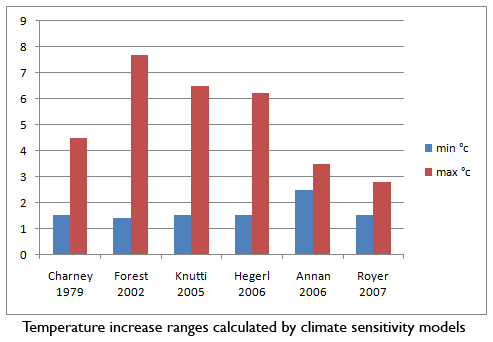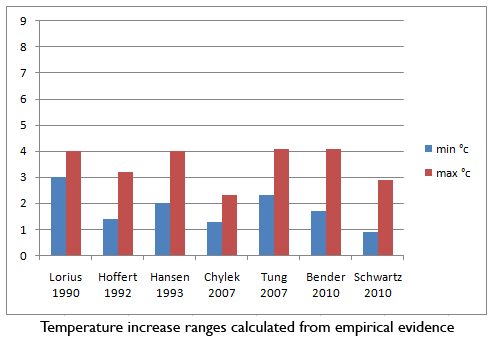Risky Business: Gambling on Climate Sensitivity
Posted on 21 September 2010 by gpwayne
There are some things about our climate we are pretty certain about. Unfortunately, climate sensitivity isn’t one of them. Climate sensitivity is the estimate of how much the earth's climate will warm if carbon dioxide equivalents are doubled. This is very important because if it is low, as some sceptics argue, then the planet isn’t going to warm up very much. If sensitivity is high, then we could be in for a very bad time indeed.
There are two ways of working out what climate sensitivity is (a third way – waiting a century – isn’t an option, but we’ll come to that in a moment). The first method is by modelling:

Climate models have predicted the least temperature rise would be on average 1.65°C (2.97°F) , but upper estimates vary a lot, averaging 5.2°C (9.36°F). Current best estimates are for a rise of around 3°C (5.4°F), with a likely maximum of 4.5°C (8.1°F).
The second method calculates climate sensitivity directly from physical evidence:

These calculations use data from sources like ice cores, paleoclimate records, ocean heat uptake and solar cycles, to work out how much additional heat the doubling of greenhouse gases will produce. The lowest estimate of warming is close to the models - 1.8°C (3.24°F ) on average - but the upper estimate is a little more consistent, at an average of around 3.5°C (6.3°F).
It’s all a matter of degree
To the lay person, the arguments are obscure and complicated by other factors, like the time the climate takes to respond. But climate sensitivity is not just an abstract exchange of statistics relevant only to scientists. It also tells us about the likely changes to the climate that today's children will inherit.
Consider a rise in sea levels, for example. Predictions range from centimetres to many metres, and the actual increase will be governed by climate sensitivity. The 2007 IPCC report proposed a range of sea level rises based on different increases in temperature, but we now know they underestimated sea level rise, perhaps by a factor of three, in part because of a lack of data about the behaviour of Greenland and Antarctic ice-sheets.
Current estimates of sea level rise alone, as a result of a two degree rise in temperature, are very worrying. More worrying is that the current projections do not account for recently accelerated melting of polar regions. There are also many other possible effects of a 2°C rise (3.6°F) that would be very disruptive.
All the models and evidence confirm a minimum warming close to 2°C for a doubling of atmospheric CO2 with a most likely value of 3°C and the potential to warm 4.5°C or even more. Even such a small rise would signal many damaging and highly disruptive changes to the environment. In this light, the arguments against mitigation because of climate sensitivity are a form of gambling. A minority claim the climate is less sensitive than we think, the implication being we don’t need to do anything much about it. Others suggest that because we can't tell for sure, we should wait and see.
In truth, nobody knows for sure quite how much the temperature will rise, but rise it will. Inaction or complacency heightens risk, gambling with the entire ecology of the planet, and the welfare of everyone on it.
This post is the Basic version (written by Graham Wayne) of the skeptic argument "Climate sensitivity is low". For the stout of heart, be sure to also check out the Advanced Version by Dana which is currently getting rave reviews on Climate Progress.































 Arguments
Arguments
























 0
0  0
0






Comments